

Going vegetarian halves CO2 emissions from your food - health - 26 June 2014. If you stop eating meat, your food-related carbon footprint could plummet to less than half of what it was.
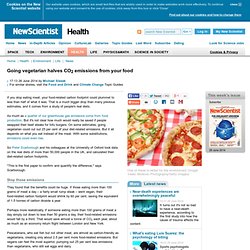
That is a much bigger drop than many previous estimates, and it comes from a study of people's real diets. As much as a quarter of our greenhouse gas emissions come from food production. But it's not clear how much would really be saved if people swapped their beef steaks for tofu burgers. On some estimates, going vegetarian could cut out 25 per cent of your diet-related emissions.
But it all depends on what you eat instead of the meat. So Peter Scarborough and his colleagues at the University of Oxford took data on the real diets of more than 50,000 people in the UK, and calculated their diet-related carbon footprints. "This is the first paper to confirm and quantify the difference," says Scarborough.
Stop those emissions They found that the benefits could be huge. Methane emissions may be far higher than estimated. The United States emits far more methane than government estimates indicate, according to new research published November 25 in the Proceedings of the National Academy of Sciences.
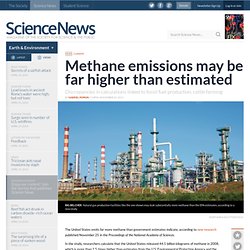
In the study, researchers calculate that the United States released 44.5 billion kilograms of methane in 2008, which is more than 1.5 times higher than estimates from the U.S. Environmental Protection Agency and the European Union. That gap is the result of errors in how EPA and the EU estimate methane emissions from oil and gas facilities and cows, the team says. The agencies compute emissions by counting methane sources such as oil rigs and cows, and then multiplying by estimates of how much gas each emitter gives off. Using this technique, EPA found that the United States put out around 29.4 billion kilograms of methane in 2008; the EU figure for the United States is 26.1 billion. Pollution Is Leading to Atmospheric Warming, Larger Clouds and Bigger Storms. Home » Environment » Pollution Is Leading to Atmospheric Warming, Larger Clouds and Bigger Storms 19 May, 2012 via DOE/Pacific Northwest National Laboratory Pollution is warming the atmosphere through summer thunderstorm clouds, according to a computational study published May 10 in Geophysical Research Letters.

Livestock is Responsible for 51% of Green House Gas Emissions. Humane Myth: Global Warming & Sustainability: Vegetarian is the New Prius. Last month, the United Nations published a report on livestock and the environment with a stunning conclusion: "The livestock sector emerges as one of the top two or three most significant contributors to the most serious environmental problems, at every scale from local to global.
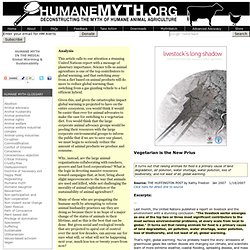
" It turns out that raising animals for food is a primary cause of land degradation, air pollution, water shortage, water pollution, loss of biodiversity, and not least of all, global warming. That's right, global warming. You've probably heard the story: emissions of greenhouse gases like carbon dioxide are changing our climate, and scientists warn of more extreme weather, coastal flooding, spreading disease, and mass extinctions. It seems that when you step outside and wonder what happened to winter, you might want to think about what you had for dinner last night. Philip Wollen: Animals Should Be Off The Menu. Livestock and Climate Change.pdf (application/pdf Object)
Why Not Eat Meat - Fishitarian Or Vegetarian? The Difference Might Be Fatal! Ocean, human, economic health threatened by widespread seafood fraud. A study conducted by Oceana, a nonprofit dedicated to assessing the health of the world’s oceans, found that seafood fraud in the United States is a poorly addressed and rampant threat to consumers and the ocean.
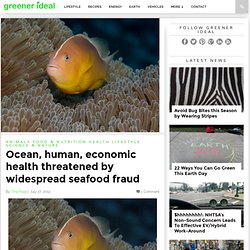
The report, Bait and Switch: How Seafood Fraud Hurts our Oceans, our Wallets and our Health, found that fish in Los Angeles was mislabeled more than the other areas included in the study, with 55 percent of all seafood sampled by DNA testing claiming to be a more expensive species than it really was. Boston seafood eaters were found to be tricked 48 percent of the time, and in South Florida, fraud was affecting 21 percent of the seafood tested. Seafood fraud is dangerous to people and to the health of ocean ecosystems. According to Oceana’s Los Angeles press release: Video: The Hidden Environmental Costs of Hamburgers. 6 Dinosaurs We Just Found Out Had X-Men Powers. #3.
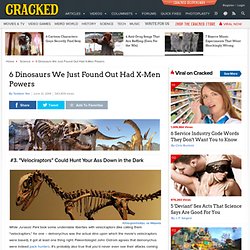
"Velociraptors" Could Hunt Your Ass Down in the Dark AStrangerintheAlps, via Wikipedia While Jurassic Park took some undeniable liberties with velociraptors (like calling them "velociraptors," for one -- deinonychus was the actual dino upon which the movie's velociraptors were based), it got at least one thing right: Paleontologist John Ostrom agrees that deinonychus were indeed pack hunters.
It's probably also true that you'd never even see their attacks coming until you found yourself in dire need of a spare liver, not because they used distraction tactics like in the movie, but because they could totally see in the dark. Yep, probably the only thing worse than having a vicious pack of snarling raptors coming to feast upon your sweetbreads is having a vicious pack of snarling raptors coming to feast upon your sweetbreads in the pitch black of night. Hemera Technologies/Photos.comAt least you don't have to watch.